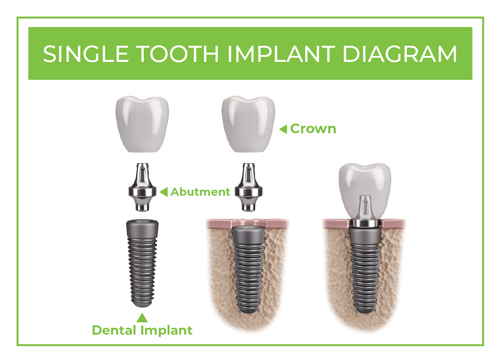Dental Implants
In an ideal world, your natural teeth would remain strong and healthy for life without ever requiring removal or replacement. However, that just isn’t reality for millions of Americans. The American Academy of Implant Dentistry reports that three million people wear full or partial dentures every year, and the number is only growing larger.
How Do Dental Implants Compare to Other Types of Tooth Restoration?
Dental implants, dentures, crowns, and bridges all replace missing natural teeth, but dental implants in Cleveland Heights, Ohio mimic them most closely. Our dental laboratory creates replacement teeth based on the color, size, and shape of your existing teeth. We also replace the roots of your missing teeth.
Dental implants are not removable. The goal after a brief period of adjustment is to forget that you’re wearing them. You have few food restrictions with dental implants compared to other types of tooth restoration methods. The procedure also improves your smile immediately because it prevents your facial muscles from sagging and implants are more comfortable to wear.
What to Expect When You Receive Dental Implants at Easton Dental
After you have completed an initial consultation, the next step is to undergo X-rays and discuss your treatment goals. We want to make sure that you have an attractive smile, don’t experience discomfort while eating, and feel pleased with your dental implants from the start.
You may need one or more teeth removed to make room for your new dental implants. Another possibility is that you will need to move bone fragments from one area of your mouth to another to provide extra stability for the dental implants that will hold your teeth in place.
Whether you need teeth or bone fragments removed or not, you will have the artificial tooth placed deep within your jaw to start the process. You will need to wait several weeks for healing and then return to have the abutment placed that holds the tooth on your jawline and finally the replacement tooth itself.
The amount of time it takes to receive your dentures in Cleveland Heights, OH depends on how many teeth you need replaced. Please contact us to request your initial consultation today.
Source:
What are Dental Implants? – The Dental Implant Experts – AAID-Credentialed Dentists (aaid-implant.org
Full Mouth Rehab
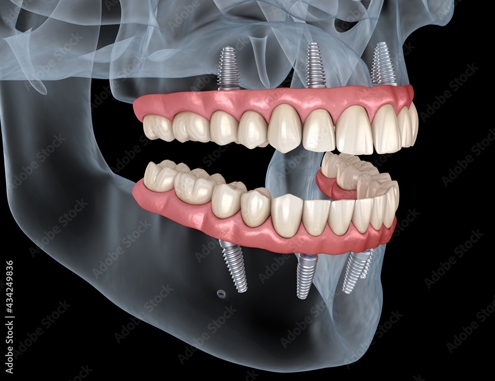 At Easton Dental, our team of amazing doctors can perform the Full Mouth Rehab procedure. This treatment is ideal for patients who have suffered for years with failing crowns or fillings, abscessed or broken teeth. Our doctors will first take a 3D scan of your mouth and discuss if you should have both jaws restored or just the upper or lower.
At Easton Dental, our team of amazing doctors can perform the Full Mouth Rehab procedure. This treatment is ideal for patients who have suffered for years with failing crowns or fillings, abscessed or broken teeth. Our doctors will first take a 3D scan of your mouth and discuss if you should have both jaws restored or just the upper or lower.
This scan is then used by the lab to design your new set of teeth. At the procedure, any remaining teeth will be removed to allow room for the doctor to place 4, 5, or even 6 dental implants in each jaw. These implants will serve as the anchor for the final teeth to fasten to. The most amazing part of this procedure is that you will go home with your new smile on the same day!
Click on the following link to view the Full Mouth Rehab procedure in greater detail: https://www.youtube.com/watch?v=FW51YQD9128
Single Tooth Dental Implant
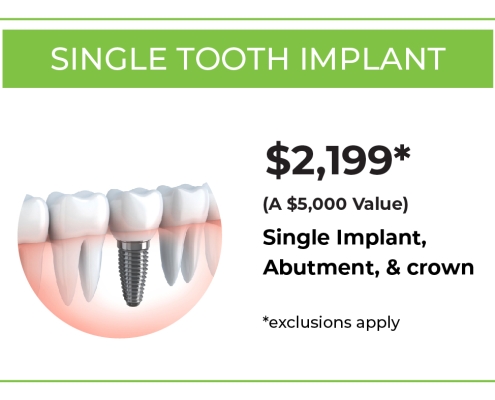
At Easton Dental, we offer a single tooth dental implant for our new and existing patients. In a vast majority of cases, patients who receive a dental implant instead of other restorative dental treatments are happy with their decision. If you have a missing tooth, or you are facing a necessary permanent tooth extraction, learn more about why you should consider a single tooth dental implant in Cleveland Heights, OH.
Dangers of Not Replacing a Missing Tooth
First, it’s important to know that replacing a missing tooth as soon as possible is imperative. Not doing so has decidedly dangerous ramifications, some of which can make it much harder to get a dental implant later on. The dangers include:
Bone Loss
Bones in the jaw are somewhat dependent on pressure to maintain bone density. When a tooth is lost, the bone at that empty space has no pressure from biting or chewing. At that point, bone loss occurs through deterioration. Over time, this can even adversely affect the jawbone, leading to a change in facial structure.
Shifting Teeth
The gap caused by a missing tooth that isn’t replaced allows abutting teeth to shift toward the empty space. Like dominoes, more and more of the teeth may become loose, endangering their health and increasing the likelihood that more permanent teeth will be lost.
Gum Disease
The gap left by a missing tooth is a trap for food debris and bad bacteria. It’s nearly impossible to keep this gap sanitized, and the risk of developing serious gum disease is increased. The bacteria can also spread to other teeth, leading to a cascade of oral health problems that will only escalate as time goes on.
Why Consider a Single Tooth Dental Implant?
There are other ways to resolve a single missing tooth, but a dental implant is, by far, the best option in most cases. A dental implant offers a solution in a way that other options cannot. Once the implant procedure is complete, you no longer have to think twice about the faux tooth. It’s completely natural looking, and you may even forget yourself which exact tooth is the dental implant!
Getting a Single Tooth Dental Implant
The process of actually getting a single tooth dental implant is very straightforward. First, you’ll come in for a consultation and oral health assessment. The dentist will cover all your medical history, and take digital images to determine the condition of the site.
If your bone density is insufficient to accept a dental implant, there are options available, such as bone grafting, sinus lift and other treatments. The next step in this case would depend on your individual circumstances.
Once the bone is dense enough to accept the implant, you’ll be scheduled for oral surgery. Under anesthesia, you’ll receive a titanium implant in the jawbone. This implant will hold the abutment that connects with the dental crown. After the implant is in place, you’ll need to wait until it “fuses” with the month, typically over a period of several weeks or a month. In the meantime, you may receive a temporary crown. Periodically, your dentist will check to see if the fusion with the bone and the implant is complete. When it is, you’ll come back for the final phase. This is when the abutment is screwed onto the titanium implant. Finally, a custom-made crown will be affixed to the abutment. This crown will fit perfectly, and will have been tinted to match the hue of your natural teeth. After a follow-up visit with your dentist at Easton Dental, the process is complete!
Implant Retained Dentures
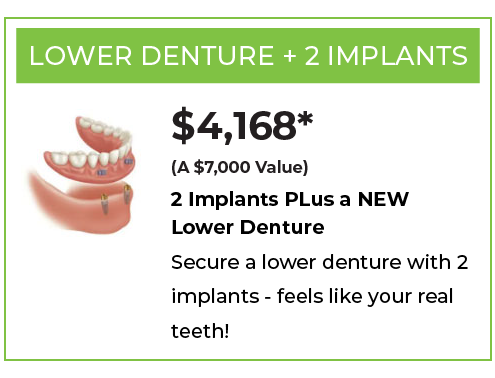 At Easton Dental, we offer implant retained dentures in Cleveland Heights, OH to our new and existing patients. For anyone who has lost multiple natural teeth, it’s understandable how embarrassing and devastating this condition can be. From a dentist’s standpoint, not only do missing teeth have a detrimental effect on self-confidence, but it is also terrible for the person’s overall oral health. It’s important to resolve the problem of missing teeth as soon as possible, to preserve the function and health of the mouth and jaw.
At Easton Dental, we offer implant retained dentures in Cleveland Heights, OH to our new and existing patients. For anyone who has lost multiple natural teeth, it’s understandable how embarrassing and devastating this condition can be. From a dentist’s standpoint, not only do missing teeth have a detrimental effect on self-confidence, but it is also terrible for the person’s overall oral health. It’s important to resolve the problem of missing teeth as soon as possible, to preserve the function and health of the mouth and jaw.
What Are Implant Retained Dentures?
Implant retained dentures offer an alternative to the dentures that your grandparents and parents may have worn. Traditional dentures have certainly stood up to the test of time, but there was a great deal of room for improvement. Implant retained dentures represent the gold standard in dentures, bringing the best of dentures and dental implants together in one convenient solution.
To better understand what implant retained dentures are, it’s helpful to understand how they fit in the mouth, compared with regular dentures. Traditional dentures stay in place with a combination of suction and dental adhesive. Implant retained dentures stay in place with the help of titanium implants in the jaw. As such, they are firmly fixed in placed, which prevents them from moving position.
These newer dentures do require oral surgery in order to implant the titanium piece. However, they are different than dental implants in that they don’t require the same quantity of titanium implants. A full arch of implant retained dentures may only require four titanium implants, whereas many regular dental implants require one titanium implant for each tooth.
Are Implant Retained Dentures Safe?
Dental implants have now been around long enough that both their safety and their efficacy have been firmly established. The part that is embedded into the jawbone is made of titanium, an inert metal that’s widely used for implants throughout the world. Titanium is strong, durable and does not break down in the body. It’s actually stronger than the bone that it’s embedded into! This is why it’s used for implant retained dentures in dental clinics worldwide.
Before getting any kind of dental implants, your dentist in Cleveland Heights, OH will carefully review your medical history. The process involves anesthesia, so you would want to be in generally good health to undergo the procedure. You and your dentist will discuss any medication or supplements that you’re taking, as well as any underlying conditions that you may have.
In order for the implant retained denture procedure to be a success, there must be sufficient jawbone in quantity and density. This will be assessed by your dentist with the help of digital imaging. If all is well, the procedure can proceed. If not, other steps may be needed before you can get the implants.
Options For Insufficient Bone Density
If it’s determined that the jawbone is not dense enough, then you and your dentist have some options. One of them is bone grafting, where bone is lifted from another area of the body and placed where it’s needed in the jaw.
Another option is a sinus lift, where more jaw bone is exposed to accept the implant. There are other options, too, which your dentist will explain in detail.
Procedure For Implant Retained Dentures
Once you’re given the okay to proceed, the dentist will use anesthesia and insert the implants. The next phase is a waiting period, during which the bone fuses around the titanium implants. This process is called osseointegration, and it can take several weeks or even a month. Periodically, your dentist will check on the progress. When the fusion is complete, the dentist will install an abutment piece, which screws onto the top of the titanium implant. Next, the dentures are snapped onto the abutment pieces, and the dentist will make any necessary final adjustments to ensure a good fit that’s comfortable for you. You’ll then have one or two follow up visits to make sure the implant retained dentures continue to serve your needs.
If you have multiple missing teeth for any reason, you’ll be amazed at how great it feels to finally be able to confidently talk, smile and chew with implant retained dentures. Contact your dentist at Easton Dental today to book your appointment and to learn more about this transformative dental procedure.
Caring For Your Dental Implant
Caring for your dental implant is as simple as caring for your natural teeth. You’ll want to brush, floss and rinse as usual. One thing to be aware of is that you should never use over-the-counter teeth whitening products on your dental implant, as they were not intended for man-made materials, and the resulting color will be unexpected and probably unwanted.
To learn more about getting a single tooth dental implant in Cleveland Heights, OH, contact us today to book an appointment for your first consultation!
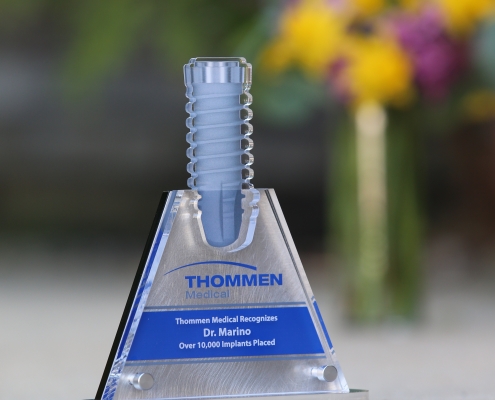

Thommen Implants | The Best Dental Implant Technology
What Our Patients Have to Say

